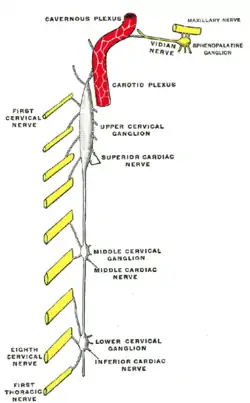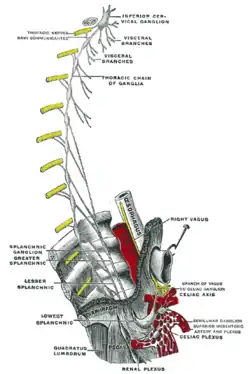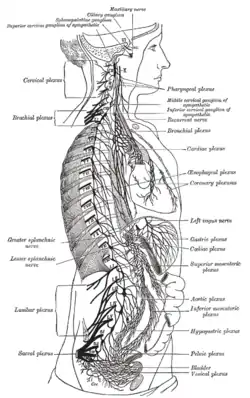Inferior cervical ganglion
The inferior cervical ganglion is situated between the base of the transverse process of the last cervical vertebra and the neck of the first rib, on the medial side of the costocervical artery.
| Inferior cervical ganglion | |
|---|---|
 Diagram of the cervical sympathetic. ("Lower cervical ganglion" labeled at bottom right.) | |
 Plan of right sympathetic cord and splanchnic nerves. (Inferior cervical ganglion labeled at upper right.) | |
| Details | |
| Innervates | Thyroid |
| Identifiers | |
| Latin | ganglion cervicale inferius |
| TA98 | A14.3.01.019 |
| TA2 | 6611 |
| FMA | 6961 |
| Anatomical terms of neuroanatomy | |
Its form is irregular; it is larger in size than the middle cervical ganglion, and is frequently fused with the first thoracic ganglion, under which circumstances it is then called the "stellate ganglion."
Structure
It is connected to the middle cervical ganglion by two or more cords, one of which forms a loop around the subclavian artery and supplies offsets to it. This loop is named the ansa subclavia (Vieussenii).
The ganglion sends gray rami communicantes to the seventh and eighth cervical nerves.
Branches
The inferior cervical ganglion gives off two branches:
- The Inferior cardiac nerve
- offsets to bloodvessels form plexuses on the subclavian artery and its branches. The plexus on the vertebral artery is continued on to the basilar, posterior cerebral, and cerebellar arteries. The plexus on the inferior thyroid artery accompanies the artery to the thyroid gland, and communicates with the recurrent and external laryngeal nerves, with the superior cardiac nerve, and with the plexus on the common carotid artery.
Development
It is probably formed by the coalescence of two ganglia which correspond to the seventh and eighth cervical nerves.
Additional images
 The right sympathetic chain and its connections with the thoracic, abdominal, and pelvic plexuses.
The right sympathetic chain and its connections with the thoracic, abdominal, and pelvic plexuses.
See also
External links
- Anatomy photo:31:07-0200 at the SUNY Downstate Medical Center - "The Sympathetic Trunk and Cervical Ganglia"